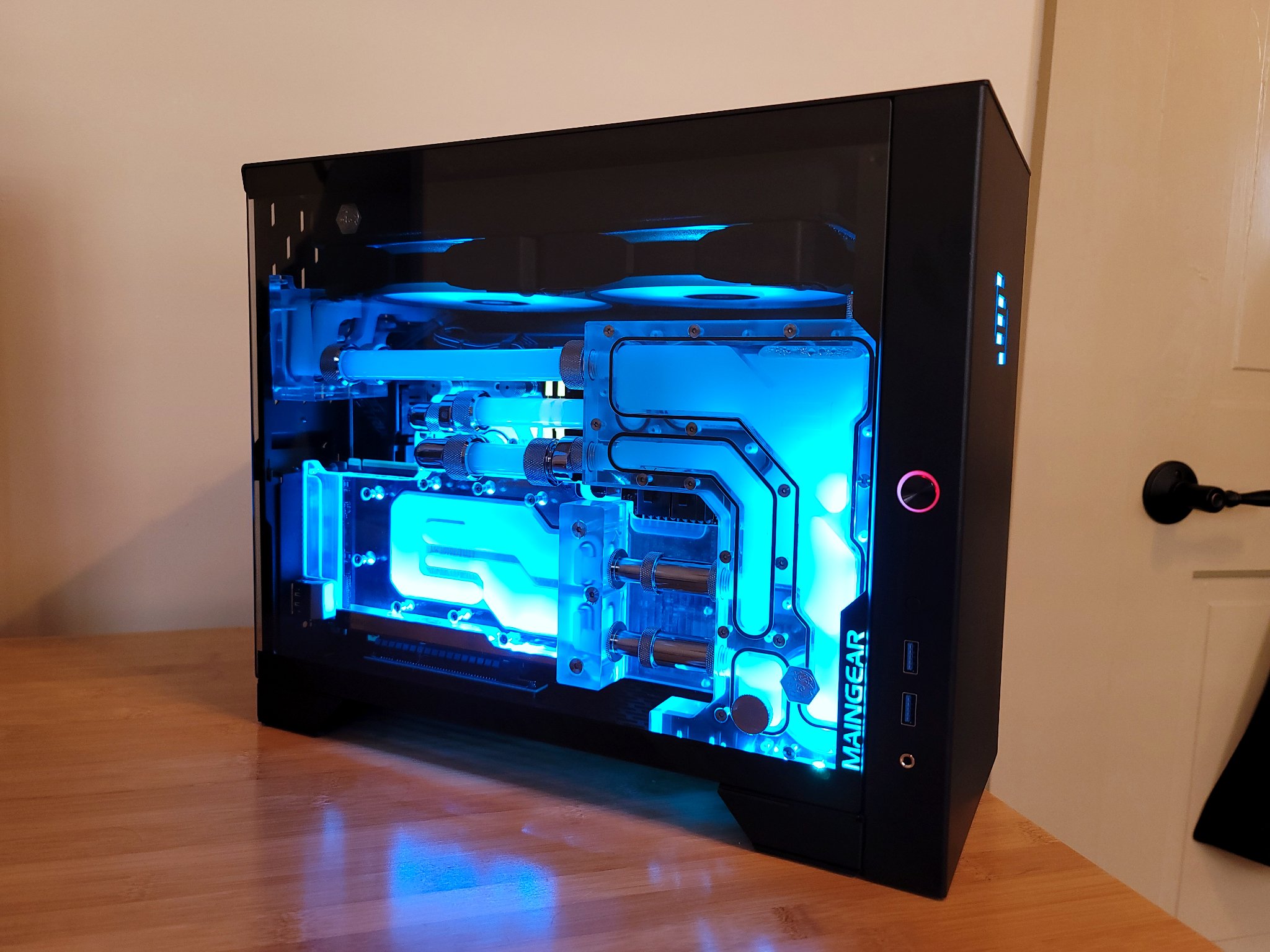For many PC gamers, building your own rig is one of the biggest thrills of foregoing consoles and going all-in on PCs. Even for the most diehard PC gaming fans out there, though, there are merits to going with a custom builder, particularly if you want to make sure you've got the cleanest look possible. That's particularly true if you're going to go small with a compact build.
Maingear's latest PC, the Maingear Turbo, checks both of those boxes, managing to pack a dizzying level of power into a chassis that is much smaller than your usual full-tower gaming setups. More importantly, it doesn't sacrifice on power, combining robust chips from AMD with an incredibly unique custom water cooling setup on the higher-end models. But is it worth the high asking price?
Let's jump in and check it out.
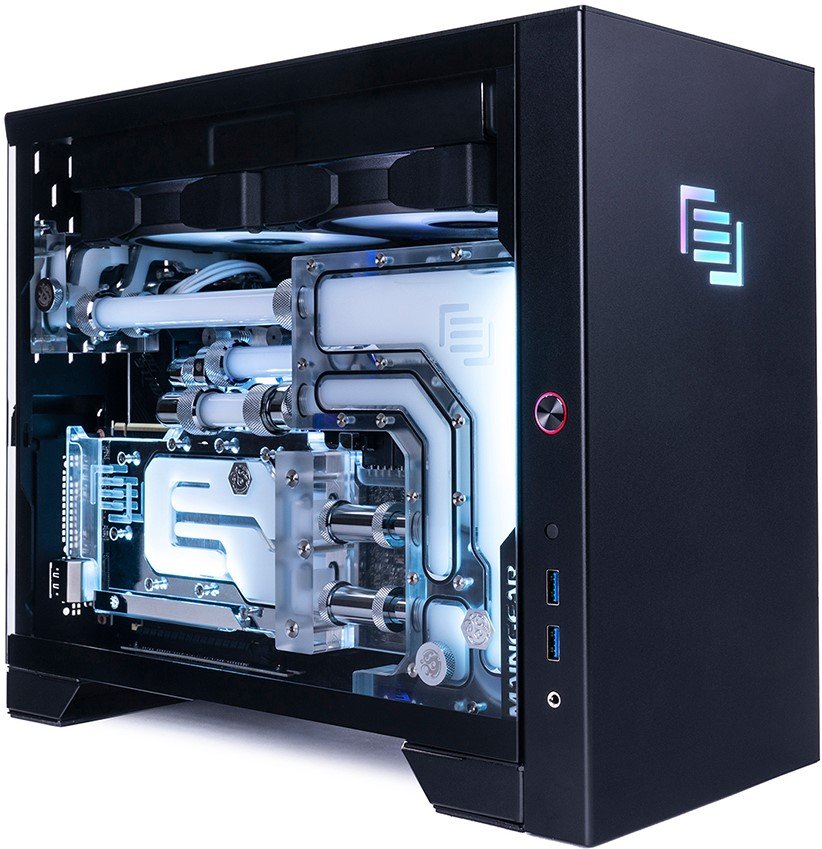
From $1,495 at MaingearBottom line: The Maingear Turbo may be small, but it doesn't skimp on power. It also has one of the best looking custom water coolers we've seen.
For
- Gorgeous custom water cooling
- Plenty of power
- Very compact
- Sturdy build quality
Against
- Very expensive
- No Intel CPU options
Maingear Turbo: What you'll love
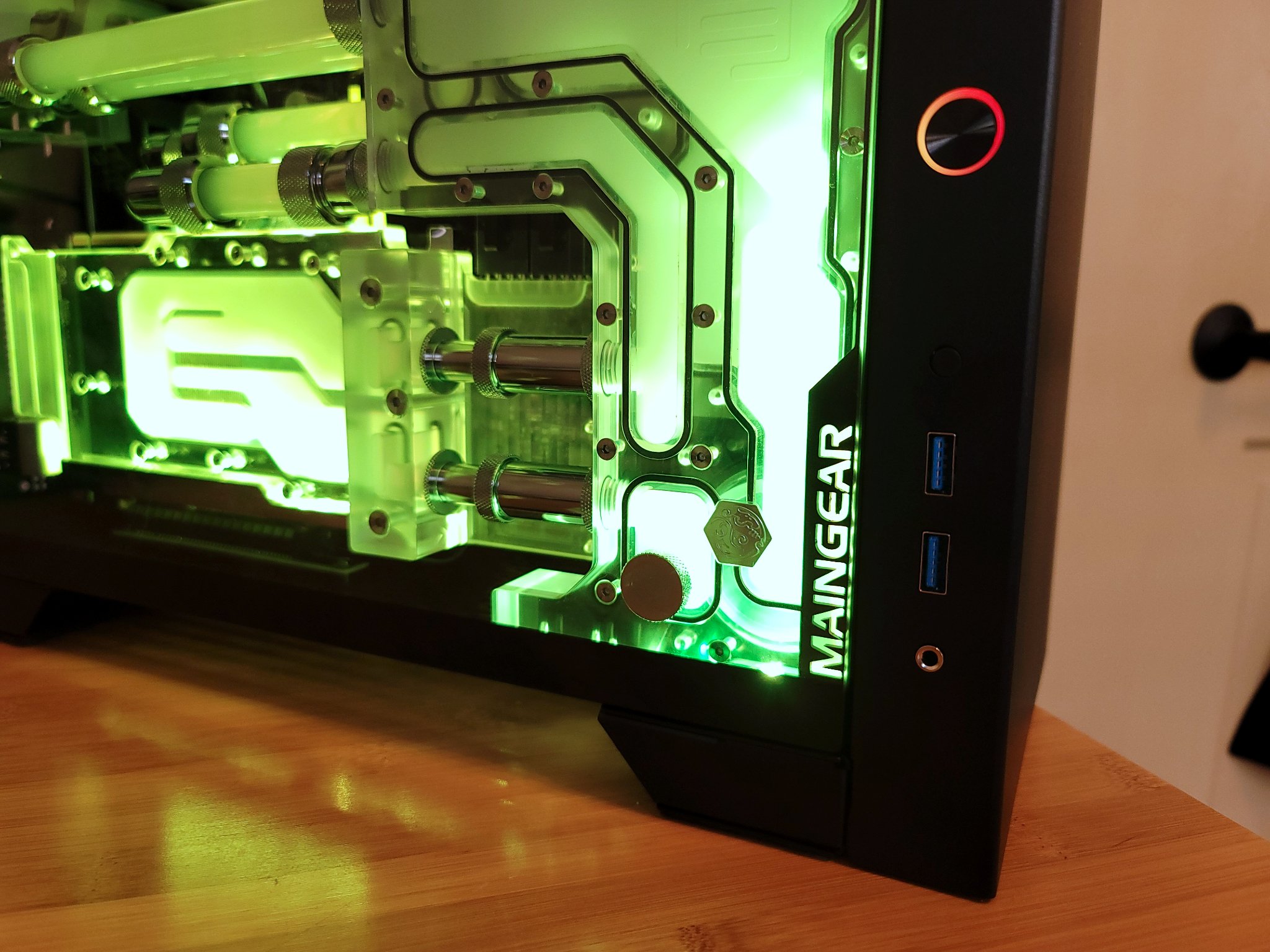
It's hard to overstate the phenomenal craftsmanship of the Maingear Turbo's design. This isn't the smallest PC you can build by any means, but it strikes a solid balance between a small size and making room for the various components inside. The result is a PC that, while still bigger than a console, feels incredibly solid, dense, and could give consoles a run for their money.
It's hard to overstate the phenomenal craftsmanship of the Maingear Turbo's design.
The unit Maingear sent Windows Central is also equipped with its high-end APEX custom liquid cooling system. Maingear says APEX is machined "solid blocks of crystal-clear acrylic," and it's a stunning sight to see — especially when combined with the RGB lighting throughout. The polished chrome fittings used to connect the various parts of the cooling system are a nice touch that adds even more of a premium look to the whole package.
Most importantly, it's quiet. The APEX cooling system runs through all of the PC components, from the CPU to the graphics card, leaving only a barely-audible hum from the exhaust fans at the top of the case. Under load, you can hear that hum get a bit louder, but it's still vastly quieter than a typical gaming PC would be when running an intense game at 4K or churning large video files.
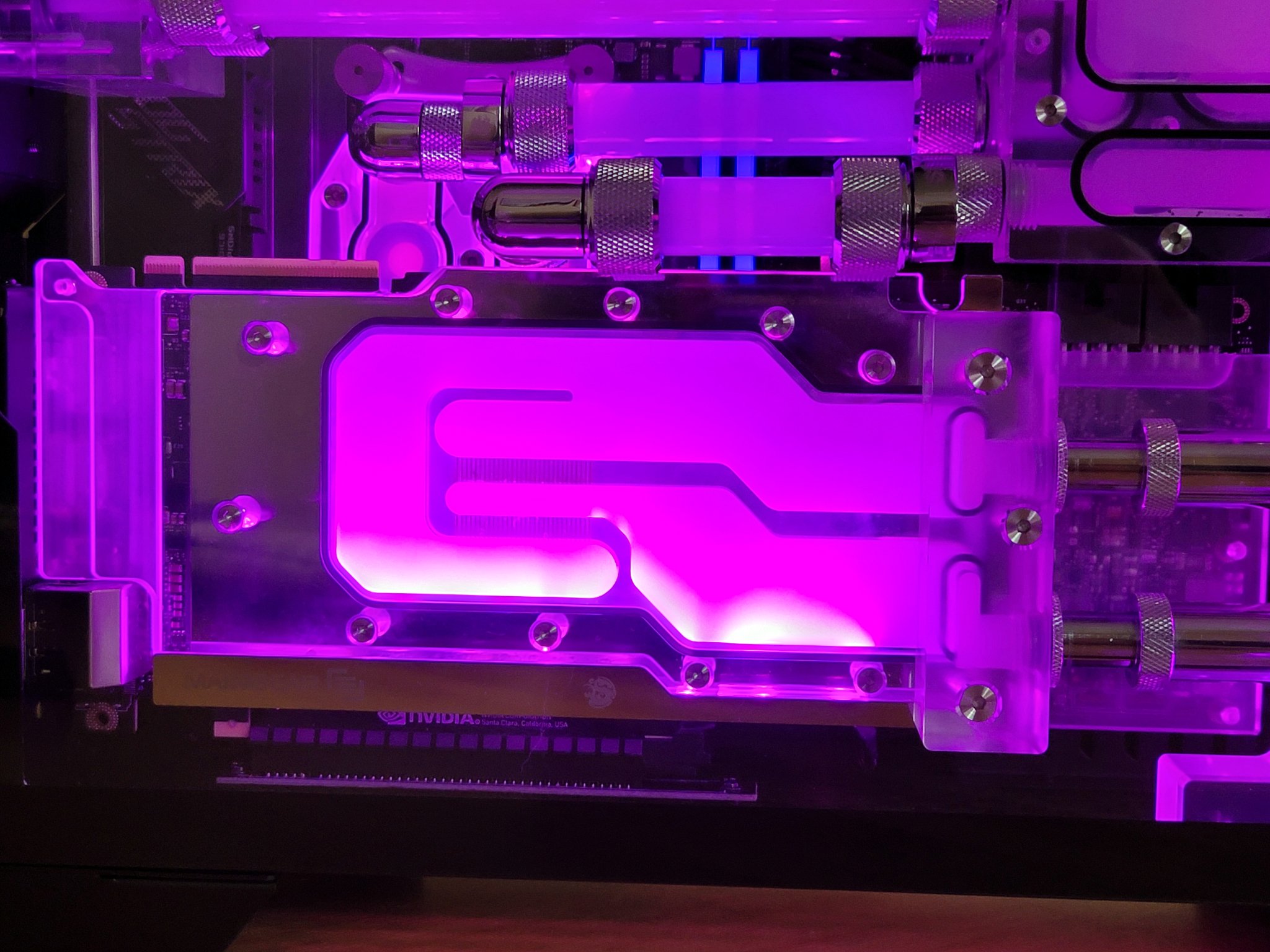
The Maingear Turbo can be equipped with a wide range of hardware. The model sent to Windows Central was equipped with an AMD Ryzen 9 3900XT 12-core processor, 32GB of RAM, and an NVIDIA GeForce RTX 2080 Ti graphics card. Here's a quick look at the available hardware specs:
| Category | Maingear Turbo |
|---|---|
| Operating System | Windows 10 |
| Processor | Up to AMD Ryzen 9 3950X, 16-core 3.5GHz (4.7GHz max boost) |
| Graphics | AMD: Up to Radeon 5700XT 8GB GDDR6NVIDIA: Up to GeForce Titan RTX 24GB GDDR6 |
| Memory | Up to 64GB DDR4-3600 |
| Storage | Up to 2x m.2 NVME SSDsUp to 1HDD or 2x SSDs |
| Motherboards | AMD X570: ASUS ROG Strix X570-I Gaming | AMD B550: ASROCK B550M-ITX/AC |
| Power Supply | SF750 750-watt 80 PLUS Platinum Certified High Performance SFX PSU |
| Cooling | EPIC 240 SuperCool CPU closed loopAPEX hand crafted liquid cooling |
| Dimensions | 12.3" (312.42mm) x 14.4" (365.76mm) x 6.7" (170.18mm) |
| Weight | 35 lbs (average) |
As you'd expect from a high-end build, the Maingear Turbo configuration reviewed here crushed every task we threw at it. Taking Borderlands 3 on ultra settings, the Turbo held steady at around 90 frames per second at 1440p. Bumping things up to 4K on ultra settings dipped things significantly, coming in approximately 40 frames per second. However, there's plenty of headroom, particularly at 1440p, to bump those framerates up even higher if you're willing to dial the visual settings down a bit.



As a newer game, Borderlands 3 can be quite taxing. If you have a slate of older games that you frequently play, however, the system shines. I'm an occasional World of Warcraft player, for example, and the Turbo had no trouble pushing framerates over 140 frames per second with visual settings pushed to ultra.
Here's a look at how the Maingear Turbo performed across our usual mix of benchmarks.
3DMark
Time Spy (Higher is better)
| PC | GPU | Score |
|---|---|---|
| Maingear Turbo | RTX 2080 Ti | 14,028 |
| Maingear Vybe | RTX 2080 SUPER | 11,217 |
| MSI Aegis R | RTX 2070 | 8,573 |
| Acer Nitro 50 | RX 580X | 4,032 |
| Lenovo Legion C530 Cube | GTX 1050 Ti | 2,536 |
| Lenovo Legion T730 Tower | GTX 1060 (6 GB) | 4,081 |
| Lenovo Legion C730 Cube | GTX 1060 (6 GB) | 3,971 |
| Lenovo Legion Y520 Tower | GTX 1060 (3 GB) | 3,621 |
| Lenovo Legion Y720 Tower | GTX 1070 | 5,520 |
| Lenovo Legion Y920 Tower | GTX 1080 | 6,774 |
| Lenovo Legion Y720 | GTX 1060 | 3,469 |
| Lenovo Legion Y520 | GTX 1050 Ti | 2,491 |
The Maingear Turbo's RTX 2080 Ti performed exceptionally well with the Time Spy benchmark.
3DMark
Fire Strike (Higher is better)
| PC | GPU | Score |
|---|---|---|
| Maingear Turbo | RTX 2080 Ti | 26,350 |
| Maingear Vybe | RTX 2080 SUPER | 23,337 |
| MSI Aegis R | RTX 2070 | 19,180 |
| Acer Nitro 50 | RX 580X | 11,583 |
| Lenovo Legion C530 Cube | GTX 1050 Ti | 6,773 |
| Lenovo Legion T730 Tower | GTX 1060 (6 GB) | 10,694 |
| Lenovo Legion C730 Cube | GTX 1060 (6 GB) | 10,564 |
| Razer Blade 15 | GTX 1070 | 13,560 |
| Lenovo Legion Y520 Tower | GTX 1060 (3 GB) | 9,078 |
| Lenovo Legion Y720 Tower | GTX 1070 | 13,172 |
| Lenovo Legion Y920 Tower | GTX 1080 | 16,996 |
| Lenovo Legion Y720 | GTX 1060 | 9,017 |
| Lenovo Legion Y520 | GTX 1050 Ti | 6,623 |
Similar to Time Spy, the RTX 2080 Ti crushed the Fire Strike benchmark as well.
CPU
Geekbench 4.0 Benchmarks (Higher is better)
| Device | CPU | Single core | Multi core |
|---|---|---|---|
| Maingear Turbo | AMD Ryzen 9 3900X | 5,938 | 47,117 |
| Maingear Vybe | Intel Core i9-9900K | 6,048 | 34,502 |
| MSI Aegis R | Intel Core i7-9700 | 5,442 | 26,310 |
| Acer Nitro 50 | Ryzen R5 2500X | 4,246 | 14,777 |
| Lenovo Legion C530 Cube | i5-8400 | 4,758 | 17,409 |
| Lenovo Legion T730 Tower | i7-8700K | 5,396 | 21,918 |
| Lenovo Legion C730 Cube | i7-8700K | 5,381 | 22,015 |
| Razer Blade 15 | i7-8750H | 4,872 | 17,910 |
The AMD Ryzen 9 3900XT has 12 cores and runs at a base clock speed of 3.8GHz, but can boost to 4.7 GHz.
PCMark
PCMark Home Conventional 3.0
| Device | Score |
|---|---|
| Maingear Turbo | 6,824 |
| Maingear Vybe | 6,992 |
| MSI Aegis R | 6,573 |
| Acer Nitro 50 | 4,138 |
| Lenovo Legion C530 Cube | 4,560 |
| Lenovo Legion T730 Tower | 5,000 |
| Lenovo Legion C730 Cube | 5,004 |
PCMark determines how well all of your PCs hardware works together for everyday tasks. The Maingear Turbo performed very well in this test, only being bested by Maingear's Vybe PC.
HDD
CrystalDiskMark (Higher is better)
| Device | Read | Write |
|---|---|---|
| Maingear Turbo | 4,995 | 4,280 |
| Maingear Vybe | 1,698 MB/s | 1,756 MB/s |
| MSI Aegis R | 982 MB/s | 957 MB/s |
| Acer Nitro 50 | 165.7 MB/s | 175.2 MB/s |
| Lenovo Legion C530 Cube | 931.0 MB/s | 159.9 MB/s |
| Lenovo Legion T730 Tower | 1,604 MB/s | 235.0 MB/s |
| Lenovo Legion C730 Cube | 1,552.9 MB/s | 258.9 MB/s |
| Razer Blade 15 | 2,722 MB/s | 1,217 MB/s |
Using an NVMe SSD, the Maingear Turbo is exceptionally fast.
If you're mainly gaming at 1440p or 1080p resolutions, the Maingear Turbo should perform exceptionally well with framerates peaking north of 100 frames per second on most games with high settings. It should also be a great PC for 4K gaming, though you'll have to turn down the visual settings to reach anything approaching 60 frames per second. For 4K gaming, you might do well to wait for NVIDIA's latest GeForce RTX 30 series graphics cards.
Maingear Turbo: What you'll dislike
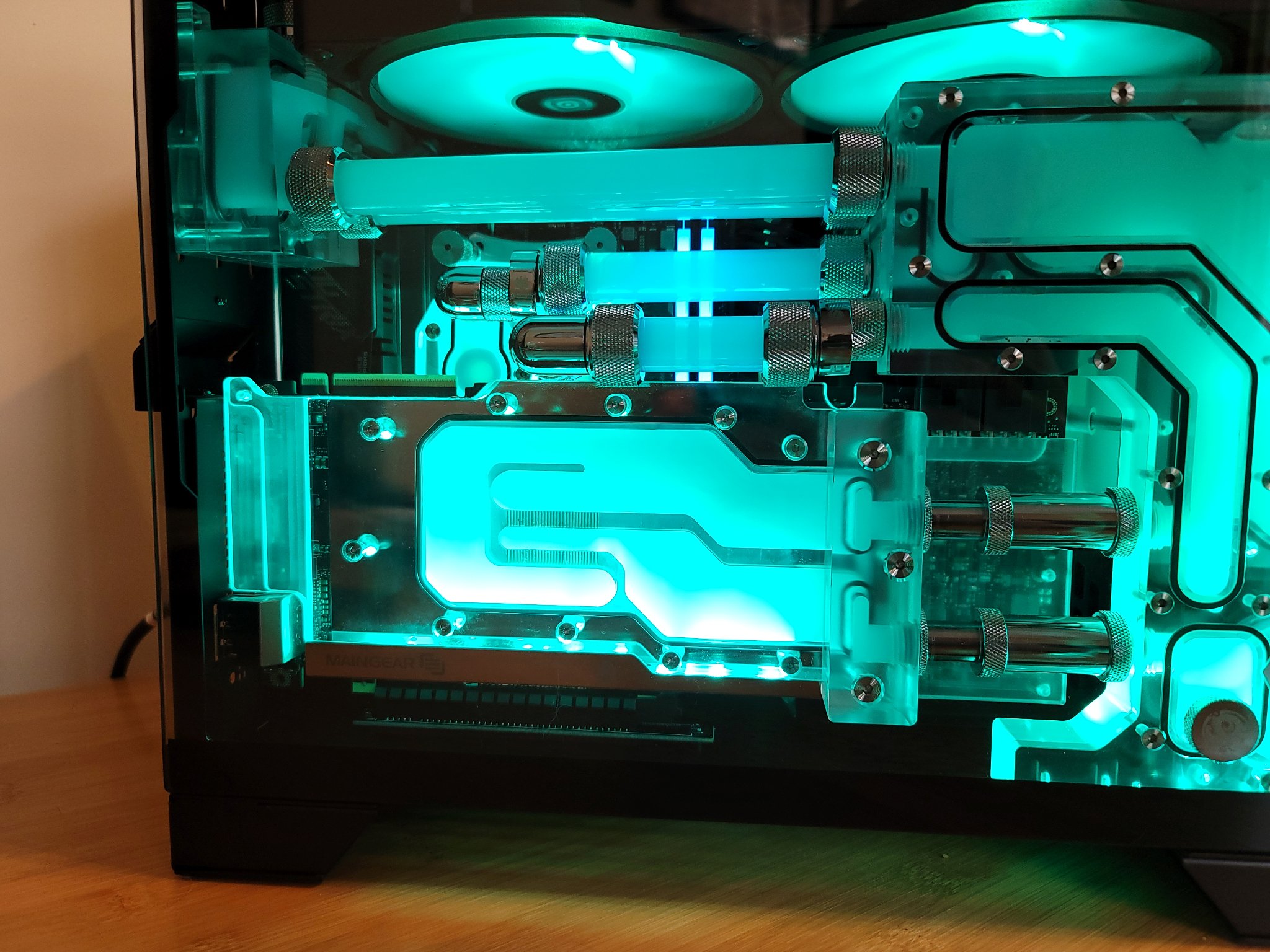
One significant barrier to entry for the Maingear Turbo is its price. It starts at $1,495 for the base configuration, but it quickly climbs in price from there. To get to the maximum configurations with Maingear's custom APEX cooling system, you're looking at above $5,000, which is probably out of reach for many buyers. Fortunately, there's a wide variety of ways you can configure the Turbo without the APEX cooling system, in which case you'll get a standard liquid CPU cooler packed in.
Despite its wealth of customization options, there's another big downside to choosing the Turbo. There are no configurations available with Intel CPUs. Maingear has gone all-in with AMD on this particular system, meaning you're locked out of picking Intel's 10th generation chips.
That's not necessarily a bad thing if you're not particularly tied down to either major CPU maker. AMD's Ryzen series performs admirably and can crunch through tasks, particularly if you aim for the higher end. However, it's worth noting there's no wiggle room here if you're considering an Intel system.
Lastly, if you do decide to shell out for Maingear's APEX cooling system, you're going to be severely limited when it comes to upgrading your PC parts. Between the size of the chassis and the custom-cut liquid cooling setup, even swapping out your graphics card is likely a no-go. That's particularly true if you're looking to upgrade to NVIDIA's latest RTX 30 series, which features some of the chunkiest graphics cards we've seen thus far.
Should you buy the Maingear Turbo?
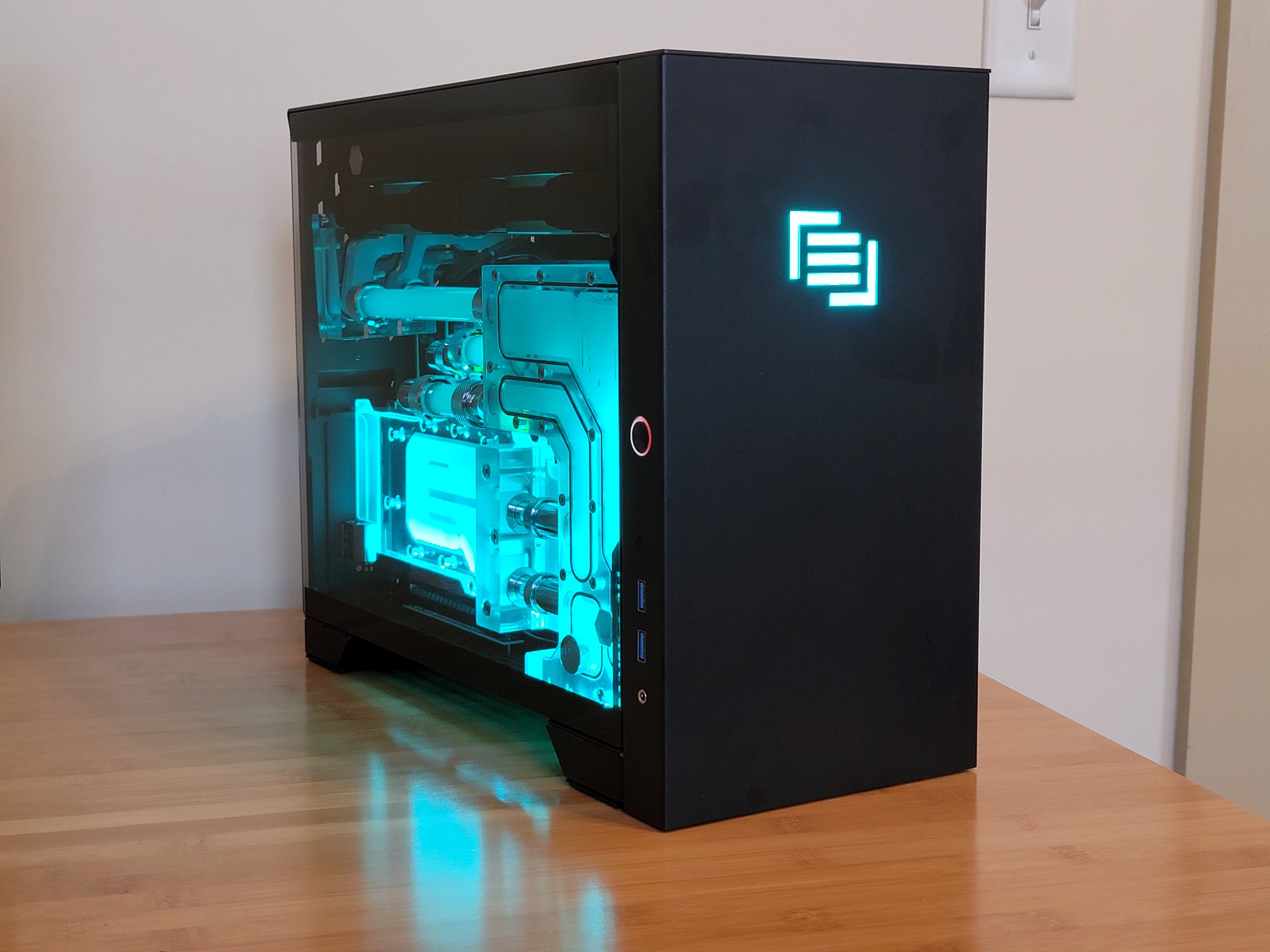
If you have the money to spare and aren't married to the idea of building your own rig, the Maingear Turbo is definitely worth considering. Its compact size and custom APEX cooling definitely make it an excellent showpiece that can consistently tackle virtually any intense game or task you throw at it. It's easily one of the best gaming desktop PCs out there right now if you're going the pre-built route.
If money is tight, or having a compact rig isn't crucial to you, then you may want to consider another pre-built system. The Maingear Vybe, for example, offers ample performance and configurations start at $700.
Dan Thorp-Lancaster is the former Editor-in-Chief of Windows Central. He began working with Windows Central, Android Central, and iMore as a news writer in 2014 and is obsessed with tech of all sorts. You can follow Dan on Twitter @DthorpL and Instagram @heyitsdtl.
